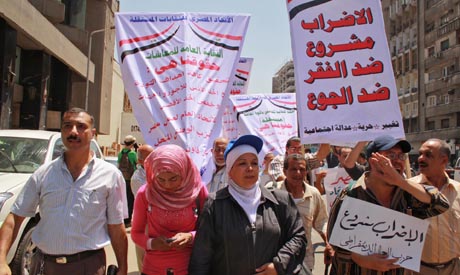
File image. (Photo: Mai Shaheen)
On Saturday evening, Kamal Abbas of the Centre for Trade Union and Worker Services held an iftar dinner and panel discussion at the Association for Upper Egypt with a focus on Egypt’s labour scene.
Representatives of several parties, including the Wafd Party, the Egyptian Socialists, the Freedom and Justice Party (affiliated with the Muslim Brotherhood), the Tagammu and the Free Egyptians spoke on their party's agendas regarding labour and specifically the trade unions law currently in the pipeline.
Trade union representatives were also in attendance as well as members of the appointed Egyptian Trade Union Federation (ETUF) steering committee that replaced the dissolved administration.
Of the steering committee’s members, Saber Barakat, a veteran trade union activist and the interim administration’s vice president, and Amina Shafiq, a founding member of the Tagammu Party and a former secretary-general of the Press Syndicate, directed much of the conversation, responding point-by-point to many speakers.
Abbas asked his guests to speak on the dynamics of the relationship between the political class and the working class, paying particular attention to cabinet-approved legislation on trade union freedoms. The importance of trade union pluralism was emphasised more than once in response to calls by the Freedom and Justice Party and the Free Egyptians to focus on unifying the labour the movement in as few bodies as possible.
Barakat responded, arguing that it was hypocritical to seek the formation of dozens of political parties and then tell trade unionists they could not innovate as well.
The relationship between trade unions and political parties was discussed. Some argued that trade unions and parties could never be truly separated. Amr Elchobaki, an Ahram political analyst, argued that in the past Egypt had either political forces without social bases and ideologies or social froces and ideologies without voices in politics. He said the social and political were intertwined, pointing to Latin America, specifically former Brazilian President Lula da Silva, who came out of the unions, and was in essence trained by them.
Though there were some who argued it would be dangerous to have more than one trade union federation, or multiple factory unions, most agreed that pluralism was key and that true effective democracy would grow out of a backdrop of strong trade unions.
They also largely agreed that the dissolution of the ETUF’s administration was only “a fourth of a revolutionary action,” as the general unions still needed to be addressed, and dissolved.
Short link: